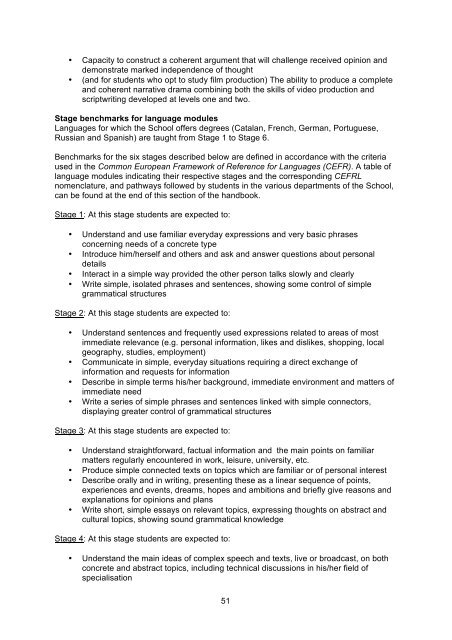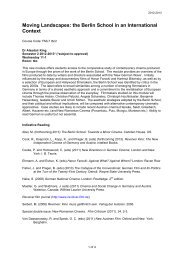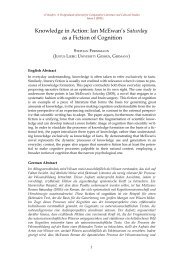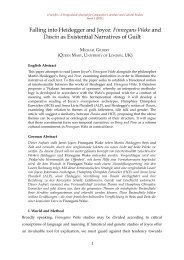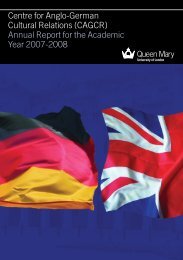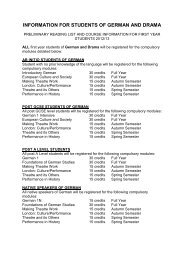Student Handbook - The School of Language, Linguistics and Film
Student Handbook - The School of Language, Linguistics and Film
Student Handbook - The School of Language, Linguistics and Film
You also want an ePaper? Increase the reach of your titles
YUMPU automatically turns print PDFs into web optimized ePapers that Google loves.
• Capacity to construct a coherent argument that will challenge received opinion <strong>and</strong><br />
demonstrate marked independence <strong>of</strong> thought<br />
• (<strong>and</strong> for students who opt to study film production) <strong>The</strong> ability to produce a complete<br />
<strong>and</strong> coherent narrative drama combining both the skills <strong>of</strong> video production <strong>and</strong><br />
scriptwriting developed at levels one <strong>and</strong> two.<br />
Stage benchmarks for language modules<br />
<strong>Language</strong>s for which the <strong>School</strong> <strong>of</strong>fers degrees (Catalan, French, German, Portuguese,<br />
Russian <strong>and</strong> Spanish) are taught from Stage 1 to Stage 6.<br />
Benchmarks for the six stages described below are defined in accordance with the criteria<br />
used in the Common European Framework <strong>of</strong> Reference for <strong>Language</strong>s (CEFR). A table <strong>of</strong><br />
language modules indicating their respective stages <strong>and</strong> the corresponding CEFRL<br />
nomenclature, <strong>and</strong> pathways followed by students in the various departments <strong>of</strong> the <strong>School</strong>,<br />
can be found at the end <strong>of</strong> this section <strong>of</strong> the h<strong>and</strong>book.<br />
Stage 1: At this stage students are expected to:<br />
• Underst<strong>and</strong> <strong>and</strong> use familiar everyday expressions <strong>and</strong> very basic phrases<br />
concerning needs <strong>of</strong> a concrete type<br />
• Introduce him/herself <strong>and</strong> others <strong>and</strong> ask <strong>and</strong> answer questions about personal<br />
details<br />
• Interact in a simple way provided the other person talks slowly <strong>and</strong> clearly<br />
• Write simple, isolated phrases <strong>and</strong> sentences, showing some control <strong>of</strong> simple<br />
grammatical structures<br />
Stage 2: At this stage students are expected to:<br />
• Underst<strong>and</strong> sentences <strong>and</strong> frequently used expressions related to areas <strong>of</strong> most<br />
immediate relevance (e.g. personal information, likes <strong>and</strong> dislikes, shopping, local<br />
geography, studies, employment)<br />
• Communicate in simple, everyday situations requiring a direct exchange <strong>of</strong><br />
information <strong>and</strong> requests for information<br />
• Describe in simple terms his/her background, immediate environment <strong>and</strong> matters <strong>of</strong><br />
immediate need<br />
• Write a series <strong>of</strong> simple phrases <strong>and</strong> sentences linked with simple connectors,<br />
displaying greater control <strong>of</strong> grammatical structures<br />
Stage 3: At this stage students are expected to:<br />
• Underst<strong>and</strong> straightforward, factual information <strong>and</strong> the main points on familiar<br />
matters regularly encountered in work, leisure, university, etc.<br />
• Produce simple connected texts on topics which are familiar or <strong>of</strong> personal interest<br />
• Describe orally <strong>and</strong> in writing, presenting these as a linear sequence <strong>of</strong> points,<br />
experiences <strong>and</strong> events, dreams, hopes <strong>and</strong> ambitions <strong>and</strong> briefly give reasons <strong>and</strong><br />
explanations for opinions <strong>and</strong> plans<br />
• Write short, simple essays on relevant topics, expressing thoughts on abstract <strong>and</strong><br />
cultural topics, showing sound grammatical knowledge<br />
Stage 4: At this stage students are expected to:<br />
• Underst<strong>and</strong> the main ideas <strong>of</strong> complex speech <strong>and</strong> texts, live or broadcast, on both<br />
concrete <strong>and</strong> abstract topics, including technical discussions in his/her field <strong>of</strong><br />
specialisation<br />
51


